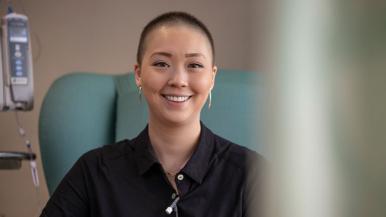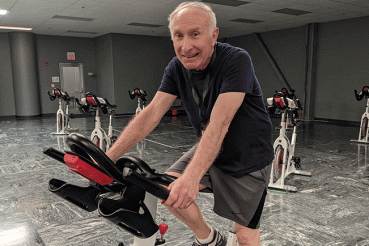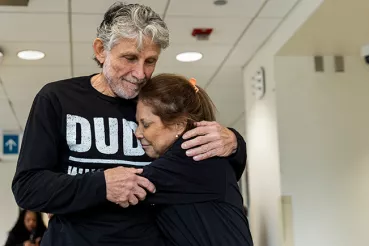In the weeks leading up to spring break, most college students are preparing to blow off steam and enjoy a week away from the school grind. But when 25-year-old Anna Wassman found a lump in her breast a few weeks before spring break, her plans — and life — took a sharp turn.
“I was doing my routine self-check, and I found a lump,” says Wassman. “I’ve always done self-checks and this felt different. I just knew something wasn’t right, even though everyone told me it was nothing, that I was too young for it to be breast cancer and that I shouldn’t worry. Unfortunately, I was right.”
After a breast ultrasound and biopsy, Wassman was diagnosed with hormone-receptive-positive, HER2 positive, invasive ductal carcinoma.
“I just wanted the cancer out of me; I felt like it was invading my body,” she says. “I had a lot of thoughts running through my head. What does this mean? Am I going to graduate? Am I going to be ok? Am I going to die? I am big on planning and controlling things in my life, but this was out of my control.”
Instead, Wassman focused on the something she could control: getting the best care possible to fight it.
A team in her corner
Her best friend put Wassman in touch with her sister, Rush breast surgeon Andrea Madrigrano, MD. Madrigrano talked Wassman through her diagnosis and what she could expect. She then connected Wassman with Rush’s breast cancer coordinator Madeline McIntosh, RN.
McIntosh helped schedule appointments for Wassman to begin her care with Rush’s comprehensive breast cancer team.
Shortly after her diagnosis, Wassman met with her care team — which included Madrigrano, medical oncologist Ruta Rao, MD, a genetic counselor and a radiation oncologist — to go over her case and establish a personalized care plan.
Her team quickly recognized Wassman’s unique concerns as a patient who was considerably younger than the average breast cancer patient. Namely, she was in her senior year of college and she did not want a breast cancer diagnosis to stop her from graduating.
“I was still in school and did not want to take off so much time,” she says.
Working closely with her care team, Wassman opted to have surgery first, which then gave her time to recover, finish classes and graduate before starting chemotherapy.
“My care team was amazing,” she says. “They respected and understood my concerns and worked with me to develop a care plan around my wants and needs.”
Madrigrano adds: “At Rush, our patients are part of the team. That team approach, personal touch and close relationship is what every patient can expect here.”
Path back to health
Wassman opted for a bilateral mastectomy. She had the surgery two weeks after her initial meeting with her Rush team.
During the surgery, Madrigrano worked side-by-side with a breast reconstructive surgeon, who placed the tissue expanders to begin preparing Wassman for breast reconstruction — which the reconstructive surgeon would complete after Wassman finished chemotherapy.
Two weeks after the surgery, Wassman underwent fertility preservation. “Because chemo can mess up your fertility, my breast cancer team recommended doing this right after the surgery,” she says. “I did not know much about fertility preservation but I trusted my breast cancer team entirely to guide me in the right direction, and I’m glad that I did.”
After recovering from surgery, Wassman was able to finish her senior year and graduate with her class. She was even able to take a quick graduation trip before starting the next phase of her treatment.
The Rush touch
While Wassman has been cancer-free since her surgery in March 2018, she began the adjuvant stage of her care plan in the summer of 2018. This has included chemotherapy, targeted therapy and ovarian suppression, all given with the goal of reducing the risk of distant recurrence. She will also be taking tamoxifen for the next five to 10 years.
She also had her breast reconstruction surgery in October 2018. “It was an immediate relief when I had the final implants,” she says. “I have seen some bad mastectomies and breast reconstructions since getting to know so many other breast cancer survivors. But my surgeons were amazing, and I am so happy with how I look and feel.”
This same sentiment has been consistent for Wassman at every level of her care at Rush.
“Everyone at Rush — from the doctors and nurses to the front desk staff and people who scheduled my appointments — has been consistently helpful, compassionate and knowledgeable,” she says. “For a while, I was coming here every single day for weeks at a time, and I’ve gotten to know my nurses and my whole care team so well. That makes a huge difference. It’s comforting to come to a place where people are so nice and so ready to help make your experience better when you’re facing something so serious like breast cancer.”




